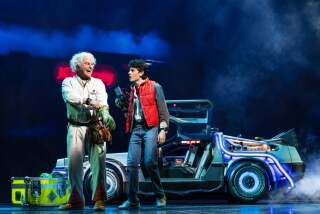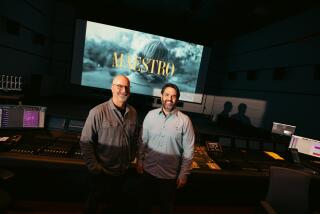Tovey: ‘Make sure they hear the next joke’
Recalling Bramwell Tovey’s debut with the Philharmonic at Disney Hall in May 2007 (he had already guest conducted at the Bowl) in a program that included Elgar’s “Enigma Variations,” Borda says he gave “one of the greatest verbal program notes I had ever heard.”
A couple of months later, Tovey deftly navigated the Bowl’s cavernous acoustical space while acting as a witty and informative guide to popular movie themes and the songs of Noel Coward. In addition to conducting, he performed a jazzy piano arrangement of “Nobody Does It Better,” Marvin Hamlisch’s theme from “The Spy Who Loved Me.”
“You win so many friends when you do something like that,” he said. “People who are perhaps uncertain about attending a classical concert might think, ‘Hey, I like what this person’s doing here. I’ll come and try something else.’ ”
Tovey doesn’t try to “educate” concertgoers. He finds that they’re more attentive when he’s funny. “They want to make sure they hear the next joke,” he said, although he noted that there are “some pieces you simply cannot be amusing about.”
For example, when he conducts Holst’s “The Planets” on Aug. 14, he’ll be inviting the audience to listen for “the broken and infirm bodies trying to move in ‘Saturn,’ the bringer of old age.”
For Tovey, speaking to the audience is especially important when introducing new music. “You would never dream of presenting a Da Vinci alongside a Damien Hirst without seducing the onlooker with a properly creative narrative,” he said. “So it is with new music.”
Born in London’s East End, Tovey, who will turn 55 on Friday, was raised by “good lower-middle-class stock” in the Salvation Army. He was named after Bramwell Booth, who was the second general of the organization.
“There’s a lot of singing and brass bands, of course,” said the conductor, who can also play the tuba. “But there’s a lot of very high-quality music-making, and part of the Salvation Army tradition is to pick up hymns or songs by ear.” He credits that tradition with giving rise to his keen improvisational ability on piano, which he honed as a young teenager.
Reaching out to everyone
IN THE last 15 or 20 years, Tovey said, the relationship between performers and concertgoers has changed. “Now I sense a real energy between audiences and orchestras, and even at solo recitals. When I first spoke to a Bowl audience, there was a lot of laughter, and the next night the orchestra asked that speakers be placed onstage so they could join in.”
The point seems to be that if audiences are being invited to get closer to the orchestra, then the orchestra wants to get closer to the audience. “At the Bowl, they can see everything in those monitors,” he said. “What I want to do is go into the dollar seats at the top and really get a sense of what goes on.”
Tovey still sees an element of “sophisticated detachment” at some of the great European festivals, such as Salzburg and Bayreuth. He ascribes that to what he calls “the European way of listening.”
“When I occasionally played ‘Rhapsody in Blue’ or jammed with visiting musicians in Europe, it was almost seen as immoral. But in North America, it’s become a much more intimate affair. Both are good for their context. At the Hollywood Bowl, it’s important to be intimate.”
More to Read
The biggest entertainment stories
Get our big stories about Hollywood, film, television, music, arts, culture and more right in your inbox as soon as they publish.
You may occasionally receive promotional content from the Los Angeles Times.






